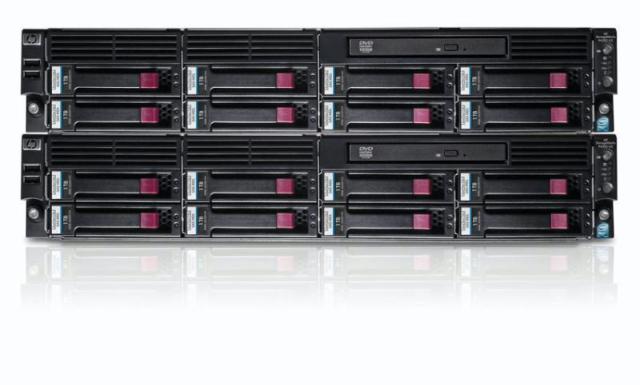HP, who’s Global Partner Conference recently came to a close, has announced the impending release of their new P4900 all-SSD storage array.
The P4900 G2 will include support for SAS, RAID 5, 10 Gbe, and 1Gbe.
The array will utilize 400 MLC SSDs in order to achieve its enormous capacity, all of which will be connected to two battery backed-up raid controllers, ensuring that any cached data is written in the event of a power failure.
The array will also include 6GB of RAM along with hot-swappable power supplies. It will be offered in both a two-node 6.4 TB variant and a one-node 3.2 TB expansion. The 6.4 TB unit and the expansion will be priced at $199,000 and $105,000, respectively.
One unique feature that HP is including with their new is product is HP SMARTSSD Wear Gauge, which is integrated into the management console and presumably uses SSD SMART info in order to give system administrators an accurate view of the drives’ remaining usable life, allowing them to be replaced ahead of time.
An interesting aspect about this news is the fact that this unveiling follows in the wake of a slew of SSD centric enterprise storage product announcements. Some have implied that continued growth in this market segment was going to be limited going forward, but with firms releasing products on what appears to be a daily basis now, that information really does seem to be suspect.
Indeed, over past couple of days, there have been a flurry of product announcements related to this industry, and there has even been a new company (Starboard Storage) founded purely on the basis that the prospects of this segment will be positive now and in the future.
Certainly, it seems that HP’s announcement really is the icing on the cake, and serves to cement the notion of a positive outlook in an industry which has been quite restless as of late. The only question now, seems to be whether the company’s interested in such hardware are going to prefer a pure solid state storage based offering, or a hybrid solution built around SSD tiering/caching whose performance may not be quite as high, but will offer exponentially greater storage capacity.
Personally, I think that caching, in many cases, if implemented correctly, offers excellent value to businesses and consumers alike. In point of fact, with companies like Diskeeper and Sandisk now crashing the consumer SSD caching party and taking on the likes of Nvelo, it seems that the industry has finally woken up and smelled the potential scope of this as yet mostly untapped market.
Hopefully, with ultrabooks taking point, this proverbial well will develop into veritable geyser, benefiting not only consumers but the industry as a whole, which truly is the best case scenario. Isn’t it nice when everybody wins? It really does make me feel like a kid again. Excuse me while I childishly ‘waste time’ and load up some of my favorite games, albeit at SSD speeds, mind you. ; )
 The SSD Review The Worlds Dedicated SSD Education and Review Resource |
The SSD Review The Worlds Dedicated SSD Education and Review Resource | 


Hey Josh – customers have the choice with the P4900 as being an SSD only solution or a hybrid. The beauty of the HP P4000 LeftHand family is that it’s a scale-out architecture, meaning that as the environment grows, customers can add new nodes to their system. Customers can mix SSD, SAS, and midline-SAS in the same management group. If they want to run their P4000 LeftHand as an all-SSD or spinning rust system, they can do that too. As they add nodes both their performance and capacity scale (as opposed to two controller RAID solutions that will at some point throttle the controllers’ performance as more disk drives are added to the system).
And if it isn’t obvious from my Twitter ID, I work for HP Storage and wrote the blog post introducing the P4900 (https://bit.ly/zrn0gL).